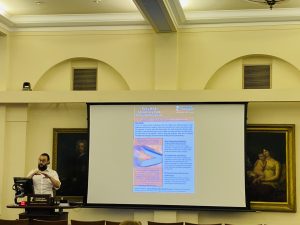May 3, 2023, by Postgraduate Placements Nottingham
Getting engaged with policy
James Bradbury reflects on the Researcher Academy’s Get Engaged with Policy programme.
The final few months of my PhD were rushing past, and my thesis deadline was hurtling towards me like a meteor, meaning I was no longer able to ignore the fact that at some point soon I would have to face post-student life. Whilst I have some hopes and ideas, I am very keen to see what avenues are available to me.
A message appeared in my emails advertising a course, “Get Engaged with Policy”, a chance for academics to consider how their research applies to a policy environment, to hear from academics who are involved in policy, and to take part in workshops to develop the skills needed to engage with policy makers. The course was delivered on four dates over three months. Each day offered speakers and a workshop.
Having spent most of my PhD alone in my lab or office, partly due to the nature of my research and partly because of Covid, I thought it would be a welcome change of pace to look at applying my knowledge and skills in a different environment. Moreover, the speakers included the Chancellor, Baroness Young of Hornsey OBE, and the Pro-Vice-Chancellor for Medicine & Health Sciences, Professor Sir Jonathan Van-Tam, both of whom would doubtless provide fascinating insights into the upper echelons of academic life and policy making.
So, on a cold February morning, I left my lab and made my way to the Senate Chamber. I did the usual engineer/physicist thing of sitting on my own and looking distracted so no one would engage with me. The hall, however, quickly filled with other delegates so that I soon found myself obliged to make small talk much. Fortunately I don’t think I came across as too socially awkward, and somehow managed to recall how to interact with other humans.
That first session set a high bar that was matched and sustained throughout the following three sessions. For the first hour we listened attentively to the speakers and had an opportunity to ask questions. My background as a PhD engineering student with a specialism in healthcare technologies meant that the opportunity to engage with Professor Sir Van-Tam, and hear first-hand his experiences during the pandemic, was a particular highlight; but all of the speakers were fascinating. It is always a pleasure to hear from people who are experts in their field. Furthermore, seeing how their passion for their work was being applied and utilised in a policy environment made me understand how many of the issues I have uncovered during my research could also benefit from policy intervention.
As well as instances of their own experiences and expertise when engaging with policy makers and relevant stakeholders, many of the speakers also provided insight as to how to make the transition from PhD to policy influencer. I’m sure I was not alone in being particularly grateful to Dr Louise Kettle (an Assistant Professor in the Faculty of Social Sciences at the University of Nottingham) for providing a range of practical tips and advice about getting started on the path towards policy.
A great lunch was provided, always a bonus! One of the simple joys at these sessions (as I have found with all the post-graduate training events I have attended) is simply learning about other people’s areas of research: from Astropharmacy to placenames on the Isle of Axholme!
“if you have an idea, if you think you have the resilience, and you would like to leave your mark on the policy world, make sure you keep an eye out for the next time this course runs.”
Then in the afternoon came the workshops, led by Dr Katherine Morgan (Researcher Training and Development Manager, Researcher Academy at the University of Nottingham). Each of the four workshops had a specific theme for engaging with policy, with the later sessions each building on the skills and knowledge already acquired. The workshop content over the four sessions included considering how our research could be applied to policy areas, identifying who the relevant stakeholders would be, and practical advice about approaching the relevant parties.
For the final session we were asked to submit our own policy brief. Having done so, it was then my privilege to be invited, along with three others, to present my policy brief to the rest of the group. I used to be a secondary school teacher, so standing in front of a room of fellow academics is well within my comfort zone and I thoroughly enjoyed the opportunity to present my case. The questions from my fellow course participants helped to shape and strengthen my vision of what my policy intervention could look like.
With my thesis submitted and my viva coming soon, my policy brief has had to take a back seat for now. It is still firmly in my field of view though, and I hope to utilise the skills I developed from the course to take it further. Attending the Getting Engaged with Policy course has certainly opened my eyes to a world that I barely understood, and with which I would have had no idea how to interact with.
One of the main takeaways from the speakers on the course was the need for perseverance when attempting to engage with and influence policy. As with academic research, sometimes you will not make the progress you desire. However, if you have an idea, if you think you have the resilience, and you would like to leave your mark on the policy world, make sure you keep an eye out for the next time this course runs. In the meantime, consider how your research could influence policy locally, nationally, or internationally. You’ll be surprised.
Find out more about Get Engaged with Policy!
No comments yet, fill out a comment to be the first



Leave a Reply